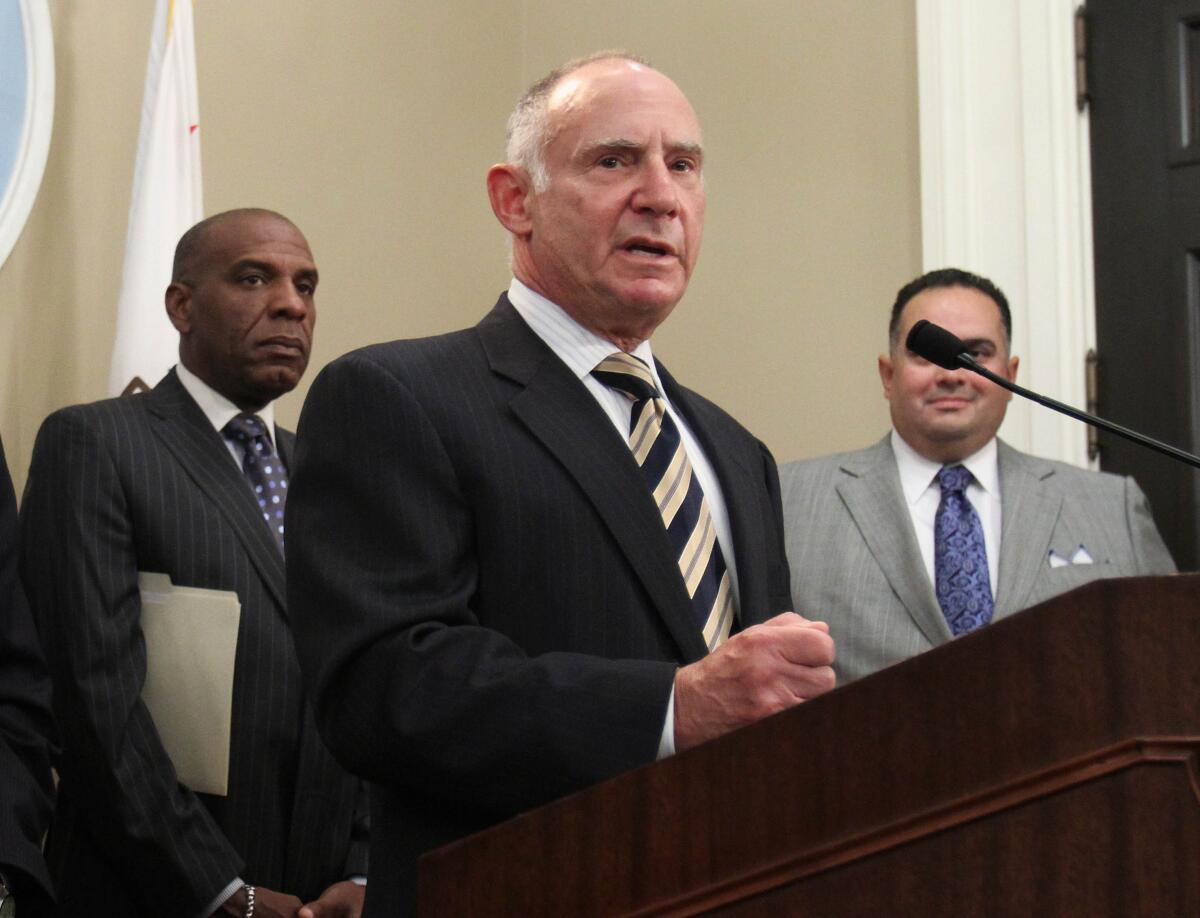After decades in California politics, Allan Zaremberg has some parting advice for the GOP

- Share via
SACRAMENTO — California is changing, so politicians and voters must change with it or lose.
That’s the parting advice of Allan Zaremberg, the retiring California Chamber of Commerce president, after four decades of dealing with lawmakers in Sacramento.
For 23 years as chamber president and chief executive, Zaremberg, 72, has been the most influential business representative in Sacramento, attempting to sway the governor and Legislature.
He has deftly handled the job despite the Capitol becoming increasingly powered by Democrats. The chamber has won far more than it has lost.
His strategy has certainly changed as labor-backed Democrats have grown into one-party rule and pro-business Republicans have fallen into virtual irrelevancy.
So, Zaremberg and the chamber have practically abandoned the losing GOP that failed to change with the state. Business quit counting on the party for legislative help. Instead, it has focused in recent years on trying to elect moderate Democrats who will listen to business concerns.
One pitch most Democrats and voters didn’t listen to was the chamber’s and retail businesses’ opposition to Proposition 47 in 2014. Zaremberg largely blames that measure for the recent rash of smash-and-grab thefts by organized criminals at high-end stores in Los Angeles and the San Francisco Bay Area.
Skelton: California is projected to have another big budget surplus. Here’s how Newsom should use it
Independent Legislative Analyst Gabriel Petek calculated a projected $31-billion budget surplus last week but cautioned he could be way off: The actual state budget surplus could range from $60 billion down to $10 billion, he reported.
Among other things, the proposition reduced many property crimes from felonies to misdemeanors. It lowered the theft of property valued under $950 from a possible felony to a misdemeanor. No prison time. Probably a wrist slap — if prosecution at all. In 2020, voters rejected Proposition 20, which would have tweaked 47 by lowering the felony threshold to $250 for many team thefts.
“No question, Proposition 47 created a problem,” Zaremberg told me. “If you commit a $900 theft in some counties, you’re probably going to get prosecuted. But in San Francisco and other counties, you’re probably not. It creates a culture in certain jurisdictions where retail theft is OK.”
Zaremberg began working in Sacramento for then-state Atty. Gen. George Deukmejian. He followed Deukmejian, a Republican, into the governor’s office in 1982, eventually becoming his chief legislative lobbyist. He also held that job for a year with Republican Gov. Pete Wilson, then lobbied for the chamber before becoming its president in 1998.
California politics has changed greatly during Zaremberg’s career.
When Deukmejian was elected governor, Republicans still could elevate candidates to statewide office. They accounted for 35% of the registered vote; Democrats 53%. In the September gubernatorial recall election, Republicans made up just 24% of registration, Democrats nearly 47% and nonparty independents 23%. Many voters have abandoned the GOP and become independents.
No Republican has been elected to statewide office since 2006. And in the Duke’s time, Republicans were competitive in the Legislature — especially because budget passage required a two-thirds majority vote. Now, Democrats hold a supermajority and the budget can be passed by a simple majority. No GOP votes needed.
Republicans have nosedived in the last 25 years.
UC Berkeley energy economist Severin Borenstein says California oil production is virtually irrelevant to the global price of crude.
“California is changing, and you have to change with it to survive,” Zaremberg says. “If you can’t evolve when all the things around you are evolving, you’re going to be left behind.”
Zaremberg means that as general advice for everyone, not just politicians and the GOP.
But “obviously the demographics of California have changed,” he notes, and that has greatly helped Democrats.
The GOP began plummeting after Wilson embraced Proposition 187 in 1994 as he was running for reelection. The measure would have cut off most public services — including schooling — for immigrants living in the country illegally. It passed overwhelmingly, pushed by an ugly TV ad created by the Wilson camp. But the proposition was eviscerated by a court.
It was a perfect storm for the California GOP. Democrats skillfully demonized Wilson among Latinos. And the Latino population grew substantially — in citizenship and on voter rolls, siding with Democrats. And now they’re California’s largest ethnic group.
But Zaremberg doesn’t want to criticize his old boss Wilson.
“History usually defines you by how you respond to crisis,” Zaremberg says. “Wilson had an earthquake, fires, floods, and his response to the crises was probably going to rank him among the best governors. Then Proposition 187 clouded that out.
“That took precedence over how history evaluates his two terms rather than as a person who handled crises better than anyone.”
A major GOP downfall was that “it didn’t recognize the changing demographics and embrace those constituents,” Zaremberg says. Republicans failed to “find a way to fit them into their agenda.
“They would say, ‘Yes, we did.’ But the registration numbers say otherwise.”
Zaremberg suggests a sports analogy for the GOP: “Did you execute your game plan? Was the game plan correct? Well, look at the score. But it’s still the first quarter looking into the future. You need to change your game plan.”
The chamber leader tried to push immigration reform when Republican George W. Bush was president.
“So many residents have been here 15 years or longer who are part of the community and part of the economy, we should find a way to make them legal [residents],” he says. “Our goal originally was to make them citizens. But that was not a good political approach. So, we tried to develop bipartisan support for them to become legal residents.
“Lacking legal status creates uncertainty and fear. And there’d be a stronger economy if business knew they could be legally hired.
“The problem in Washington was a lot of Democrats were unwilling to embrace it. And that’s what needs to happen.”
Sacramento is losing a modern rarity: a practical Republican.
More to Read
Sign up for Essential California
The most important California stories and recommendations in your inbox every morning.
You may occasionally receive promotional content from the Los Angeles Times.
















